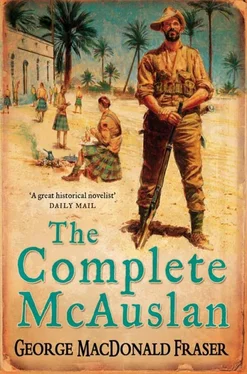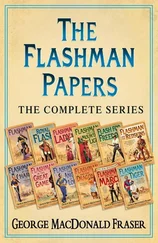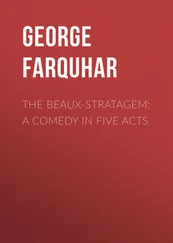He was a nondescript man called Leishman, rather older than the others, a quiet enough character. He seemed genuinely shocked when I told him his rifle was dirty, and then I turned to Sergeant Telfer and said, “Put him on a charge.” (Six months later I would have said, “Leishman, did you shave this morning?” And he, dumbfounded, knowing his chin was immaculate, would have said, “Yes, sir. I did, sir.” And I would have said, “Of course you did, and it’s all gone down the barrel of your gun. Clean the thing.” And that would have been that.)
I went off parade feeling vaguely discontented, and ten minutes later, in the company office, Cromack the clerk observed that I had shaken Leishman, no mistake. He said it deadpan, and added that Leishman was presently in the armoury, cleaning his rifle. Puzzled, for I wondered why Cormack should be telling me this, I went off to the armoury.
Sure enough, there was Leishman, pulling the cleaning-cloth through his rifle, and crying. He was literally weeping. I was shocked.
“What’s the matter?” I said, for this was a new one to me.
He snuffled a bit, and wiped his nose, and then it came out. He had been five years in the army, his discharge was coming up in a few weeks, he had never been on a charge in his life before. He was going to have his clean sheet marred almost on the eve of getting out.
“Well, for God’s sake,” I said, relieved more than anything else. “Look, don’t get into a state. It’s all right, we’ll scrub the charge.” I was quite glad to, because I felt a warning would have done. “I’m certainly not going to spoil your record,” I said.
He mumped some more, and pulled his rifle through again.
“Let’s have a look at it,” I said. I looked down the barrel, and it still wasn’t all that good, but what would you? He was obviously badly upset, but he muttered something about thanks, which just made me uncomfortable. I suppose only born leaders don’t find authority embarrassing.
“Forget it,” I said. “Give it another few pulls-through, and keep your eye on it until your ticket comes through. Okay?”
I left him to it, and about ten minutes later I was passing the door of Twelve platoon barrack-room, and heard somebody laughing inside. I just glanced as I went by, and stopped short. It was Leishman, sitting on his bunk at the far end, laughing with a bunch of his mates.
I moved on a few steps. All right, he had made a quick recovery. He was relieved. There was nothing in that. But he had seemed really upset in the armoury, shaken, as Cormack said. Now he was roaring his head off—the quality of the laughter somehow caught the edge of my nerves. I stood undecided, and then wheeled round and shouted:
“Sergeant Telfer!”
He came out of his room. “Yessir?”
“Sergeant Telfer,” I said, “stop that man laughing.”
He gaped at me. “Laughing, sir?”
“Yes, laughing. Tell him to stop it—now.”
“But …” he looked bewildered. “But … he’s just laughin’, sir …”
“I know he’s just laughing. He’s braying his bloody head off. Tell him to stop it.”
“Right, sir.” He obviously thought the sun had got me, but he strode into the barrack-room. Abruptly, Leishman’s laughter stopped, then there was what might have been a smothered chuckle, then silence.
Feeling suicidal, I went back to my billet. Obviously Leishman had thought I was a mug; I should have let the charge stick. Let someone get away with it, even a good soldier, and you have taken some of his virtue away. On the other hand, maybe he had been laughing about something else entirely; in that case, I had been an idiot to give Sergeant Telfer that ridiculous order. Either way, I looked a fool. And my service dress didn’t fit. To hell with it, I would see the Adjutant tomorrow and ask for a posting.
I didn’t, of course. That night in the mess the liverish major, of all people, asked me to partner him in a ludo doubles against the Adjutant and the M.O. (In stations where diversion is limited games like ludo tend to get elevated above their usual status.) In spite of the M.O.’s constant gamesmanship, directed against my partner’s internal condition, we won by one counter in a grandstand finish, and thereafter it was a happy evening. We finished with a sing-song—“Massacre of Macpherson” and “The Lum Hat Wantin’ the Croon”, and other musical gems—and the result was that I went to bed thinking that the world could be worse, after all.
In the morning when I inspected my platoon, Sergeant Telfer did not roll on the ground, helpless with laughter, at the sight of me. If anything, the platoon was smarter and faster than usual; I inspected the rifles, and Leishman’s was gleaming as though he had used Brasso on the barrel, which he quite probably had. I said nothing; there was no hint that the incident of yesterday had ever happened.
On the other hand, there was still no sign of the happy officer-man relationship by which the manual sets such store. We were still at a distance with each other, and so it continued. It didn’t matter whether I criticised or praised, the reception was as wary as ever.
Remembering the C.O.’s advice, I had reached the stage where I knew every man by name, and had picked up a few nicknames as well. Brown, a clueless, lanky Glaswegian, was Daft Bob; Forbes, the villainous-looking footballer, was Heinie (after Heinrich Himmler, it transpired); my own batman, McClusky, was Chick; and Leishman was Soapy. But others I had not yet identified—Pudden, and Jeep, and Darkie, and Hi-Hi; one heard the names shouted along the company corridors and floating through the barrack-room doors—“Jeep’s away for ile * the day”, which signified that the mysterious Jeep was hors de combat, physically or spiritually; “Darkie’s got a rare hatchet on”, meaning that Darkie was in a bad temper; “yon Heinie’s a wee bramar”, which was the highest sort of compliment, and so on. It was interesting stuff, but it was still rather like studying the sounds of a strange species; I couldn’t claim to be with it.
My own batman, McClusky, reflected the situation. He was a good worker, and my kit was always in excellent condition, but whereas with his mates he was a cheery, rather waggish soul, with me he was as solemn as a Free Kirk elder. He was a round, tousled lad with a happy pug face and a stream of “Glasgow patter” which dried up at the door of my room and thereafter became a series of monosyllabic grunts.
Well, I thought, this is the way it’s going to be, and it could be worse. If I couldn’t like them, yet, I could at least respect them, for they were a good platoon; when Bennet-Bruce held his full-dress monthly inspection for the Colonel, the great man was pleased to say that Twelve platoon’s kit layout was the best in the battalion. It should have been; they had worked hard enough. Having been, for a time at least, in the Indian Army, I had my own ideas about how kit should be laid out; I had taken aside Fletcher, the platoon dandy, and shown him how I thought it should be presented for inspection—if you black the soles of your boots, for example, they look better, and a little square of red and white four-by-two cloth under an oil-bottle and pull-through is smarter than nothing at all. Fletcher had watched me stonily as I went over his kit, but afterwards he had supervised the whole room in laying out their stuff on the same pattern. Our one problem had been what to do with Private McAuslan, the dirtiest soldier in the world; I solved that by sending him into town for the day as guard on the company truck, which had nothing in it anyway. His kit was placed in an out-of-the-way cupboard, his associates affecting to be disgusted by the mere sight of it, and securely locked up.
Anyway, the Colonel limped through, inspecting and approving, and when he had gone and the quiet, involuntary sigh had sounded through the big, white-washed room, I said, “Nice show, sons”. But none of them made any comment, so I left them to it.
Читать дальше












